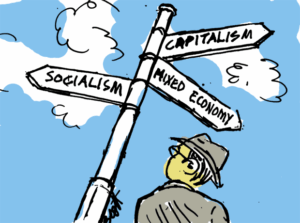Economics System SS2 Economics Lesson Note
Download Lesson NoteTopic: Economics System

An economic system may be defined as a medium or an organized way by which the means of production in a state are utilized to satisfy human wants.
The major types of economic systems are capitalism, socialism, and mixed economy.
- CAPITALISM OR FREE MARKET ECONOMY
Capitalism or free market economy may be defined as the type of economic system in which the means of production are owned and controlled by private individuals.
A country which practices capitalism could be said to have a market economy, a laissez-faire economy, an uncontrolled economy, free enterprises, or a capitalist economy. Examples of countries which practice capitalism include the U.S.A, Japan, Australia, France, Italy etc.
Features Of Capitalism
i. Private Ownership Of Properties: There is a high degree of private ownership and control of means of production with minimal participation by the state
ii. Existence Of Competition: In a market economy there is competition among the various individuals and firms as a result of an effort to acquire wealth or control means of production.
iii. Profit Maximization Motive: Capitalism is characterized by a high level of profit maximization by private investors.
iv. Freedom Of Choice: Consumers in this economy are free to choose from a wide range of goods and services
v. Production And Consumption Are Regulated By Price System: The price system determines what producers have to produce, taking into consideration the demand of the consumers and the price offered for the goods.
vi. Development Of Individual Initiatives: Individual initiatives are well developed in a market economy
vii. Wealth Accumulation: In a free market system wealth is accumulated by the capitalists.
Advantages Of Capitalism
i. Competition and rivalry lead to efficiency and full utilization of societal resources both human and material.
ii. Freedom to own properties and factor of production.
iii. It promotes an increased standard of living.
iv. It facilitates rapid economic growth and development.
v. There is increased efficiency in production.
vi. Capitalism removes the tendency for the growth of dictatorship.
vii. Talent is fully utilized.
viii. It enhances technological development.
ix. Provision of alternatives choice.
x. High standard of living.
Disadvantages Of Capitalism
i. There may be waste and inefficiency in the use of productive resources as a result of unhealthy competition among the producers.
ii. There is an exploitation of consumers.
iii. It creates a disparity of income and wealth. There is inequality in income and wealth in a capitalist economy
iv. It creates a monopoly: As a result of the economic activities of a few individual investors, a monopoly can easily be created.
v. Profit maximization at all costs: In a capitalist economy, private individuals are interested in making a profit by all means.
- SOCIALISM
Socialism also called a centrally planned or controlled economic system is defined as a type of economic system in which the means of production and distribution are collectively owned and controlled by the state (the government).
A country which practices socialism is said to have a controlled economy, a centrally planned economy, a socialist economy, or a command economy. Good examples of countries operating under socialism are Tanzania and Poland.
Features Of Socialism
- State Ownership Of Means Of Production: Ownership and control of industries resources and means of production and distribution are vested in the hands of the government. Private individuals are not allowed to own properties
- Collective Decision Making: Decisions on what to produce, how to produce and for whom to produce are taken jointly by the people
- Promotion Of Social Welfare: It is a system characterized by maximization of social welfare
- Absence Of Competition: In this type of economic system, economic rivalry associated with capitalism is non-existent.
- Absence Of Profit Motive: The major reason for carrying out productive activities is not to maximize profit but to provide for people’s welfare and raise the general standard of living
- Allocation of goods and services is carried out by the central planning committee
- Various committees are set up by the government to help in estimating people’s wants and to regulate production and consumption.
Advantages Of Socialism
i. Equitable Distribution Of Income: Incomes are equitable or fairly distributed among the people based on their needs or wants.
ii. Job Security: The interest of labour is protected in a socialist economy. Jobs are secured, therefore, unemployment is minimal.
The growth of private monopoly is checked: All productive resources are owned and controlled by the government.
iii. No Overproduction Of Goods: Goods are produced according to the needs or wants of individuals. There is no room for excess capacity or overproduction.
iv. Absence Of Exploitation: There is always an absence of exploitation since the government provides all the goods and services required by the citizens
v. Absence Of Economic Rivalry: Economic rivalries among private individuals are absent in a socialist economic system.
Disadvantages Of Socialism
i. Absence of consumer choice and satisfaction: There is no room for consumer choice and satisfaction. Any goods produced must be accepted. Goods are provided on a group basis. For example, there are teachers’ groups, nurses’ groups etc.
ii. It suppresses individual initiatives
iii. It shows down economic development.
iv. Absence Of Competition: There is the complete absence of competition in a socialist economy as all goods and services are provided by the government
v. It Leads To State Monopoly: As the state provides all essential goods and services for the citizen
vi. Absence of creativity and innovation
vii. Socialism may give rise to the growth of dictatorship
- THE MIXED ECONOMY
A mixed economy may be defined as the type of economic system in which both the private and public ownership of means of production and distribution exist together in a country. Examples of countries which operate mixed economies are Britain, Nigeria, Mexico, etc.
Features Of Mixed Economy
i. Joint ownership of means of production
ii. Joint Decision: Decisions on what to produce, for whom to produce and how to produce are jointly taken by the government and the private sector.
iii. Freedom Of Choice: There is consumer sovereignty. Consumers are free to make their choice from a wide variety of goods
iv. Presence of competition Since the means of production are owned by the state and private, there is economic rivalry and competition
v. Freedom of production, distribution and consumption: This means of production and distribution are not centrally owned by the government
vi. Government intervenes to regulate prices.
Advantages Of Mixed Economy
i. Equitable Distribution Of Income: A mixed economy ensures that incomes are equitably distributed among the citizens.
ii. There Is Freedom Of Choice: Consumers and producers in this type of economic system have a wide range of choices to make
iii. It Combines Capitalism And Socialism: A mixed economy combines the good qualities of both capitalism and socialism.
iv. Encourages Development Of Private Initiative: It ensures the growth of entrepreneurs.
v. It Prevents Monopoly: Monopoly is prevented because of the joint participation in economic activities by both the private sector and the state
vi. Encourage Growth And Development: Joint efforts of both the government and private enterprises can lead to economic growth and development.
Disadvantages Of Mixed Economy
i. Inequality of Wealth: Wealth is not equitably distributed as there is a wide gap between the rich and the poor
ii. Emphasis On Profit: There is more emphasis on profit maximization at the expense of welfare for the citizen
iii. Corruption And Mismanagement: A mixed economy encourages corruption and mismanagement, especially in the public sectors
iv. Leads To Waste Of Resources: Public sector interference in economic activities may lead to resource wastage
v. Exploitation Of Labour: Labour as a factor of production can be exploited by the public and private sectors
vi. Lack Of Efficiency: There is a lack of efficiency in productive activities and this leads to low productivity.
ASSIGNMENT
Compare and contrast capitalism and socialism






















